Zero tolerance DUI laws in the Bay Area set strict blood alcohol limits that vary by driver category. Drivers under 21 face a 0.01% BAC limit with automatic one-year license suspension. Those 21 and over have a 0.08% limit, while commercial drivers must stay under 0.04%. First-time violations trigger immediate license confiscation, fines up to $2,000, and mandatory education programs. The total cost often exceeds $10,000 with long-lasting impacts on insurance and employment. Understanding the complete scope of consequences helps drivers make informed decisions.
Key Takeaways
- Drivers under 21 face immediate license suspension for BAC levels of 0.01% or higher, lasting up to one year.
- First-time DUI offenders face fines between $500-$2,000, with total costs potentially exceeding $10,000 over five years.
- Officers use three standardized field sobriety tests: Horizontal Gaze Nystagmus, Walk-and-Turn, and One-Leg Stand, with 80-95% accuracy.
- Refusing a chemical test results in automatic one-year license suspension, regardless of actual intoxication level.
- DUI convictions remain on driving records for 10+ years and require SR-22 insurance filing for minimum three years.
Understanding Zero Tolerance BAC Limits for Different Driver Categories
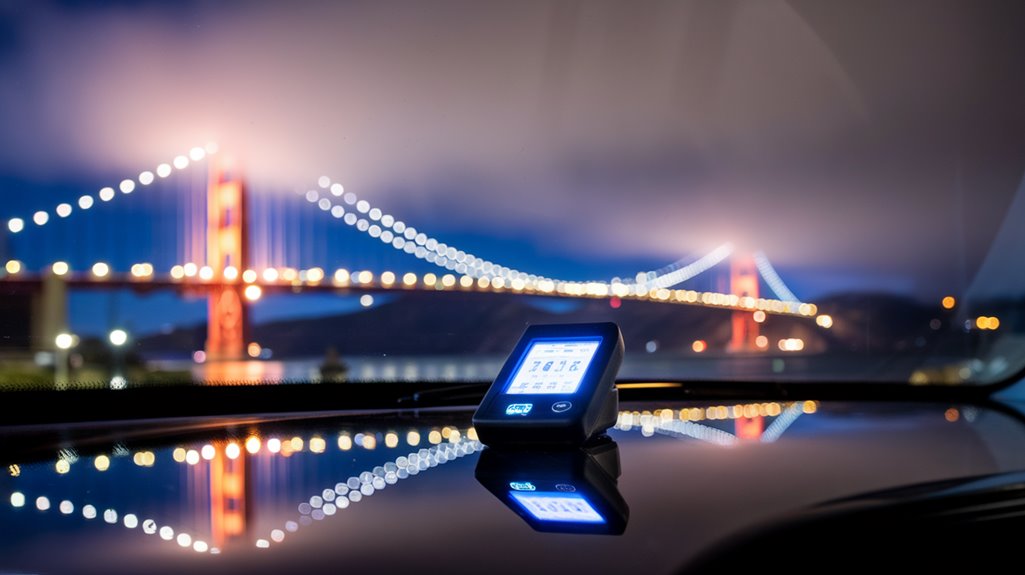
Different drivers face different rules about drinking and driving in the Bay Area. For drivers under 21, the Zero Tolerance law sets a strict 0.01% BAC limit, with underage penalties including immediate license suspension for a year or more. Even common items like mouthwash can trigger these consequences, leading to BAC misconceptions among young drivers.
Commercial drivers must stay under 0.04% BAC, facing two-year license disqualification if they exceed this limit. Regular drivers aged 21 and over have a 0.08% legal limit, though they can still face DUI charges at lower levels if showing signs of impairment. All drivers should note that having minors in the vehicle during a DUI leads to additional child endangerment charges, and first-time offenses bring substantial fines and mandatory education programs.
Immediate Consequences of DUI Arrests in the Bay Area
Bay Area law enforcement immediately confiscates licenses from drivers arrested for DUI, issuing only a temporary 30-day permit. Drivers must request a DMV hearing within 10 days to contest their suspension, or face automatic license revocation. The suspension period can last up to 6 months for drivers with BAC ≥0.08%, while under-21 drivers face immediate restrictions regardless of their BAC level.
License Suspensions and Penalties
When drivers are arrested for DUI in the Bay Area, they face two types of license suspensions: administrative actions through the DMV and court-ordered penalties. For first-time offenders, the DMV imposes a 4-month suspension if BAC is 0.08% or higher, while refusing a chemical test results in an automatic 1-year suspension.
The administrative hearing process begins within 10 days of arrest, separate from court proceedings. Court penalties range from 6 months for first offenses to 4 years for fourth offenses. First-time offenders face a 30-day hard suspension where no driving is permitted. License reinstatement procedures typically require completing DUI programs, paying fines ranging from $390 to $1,000, plus assessments totaling over $2,300. Multiple offenses require installing ignition interlock devices, adding significant costs for installation and monthly monitoring.
Field Testing and Enforcement
Law enforcement officers in the Bay Area rely on three standardized field sobriety tests to assess driver impairment. These include the Horizontal Gaze Nystagmus, Walk-and-Turn, and One-Leg Stand tests, which must follow strict NHTSA protocols.
Field testing procedures require officers to look for specific clues indicating intoxication. When administered correctly, these tests are 80-95% accurate in detecting impairment. Enforcement strategies focus particularly on drivers under 21, where any measurable alcohol triggers a DUI citation. Officers may use portable breath tests to confirm field sobriety results, though these readings aren't admissible in court. If drivers refuse testing, they face automatic license suspension and increased penalties. For underage drivers, even minimal signs of impairment like red eyes or poor coordination can lead to immediate arrest.
License Suspension and DMV Administrative Procedures
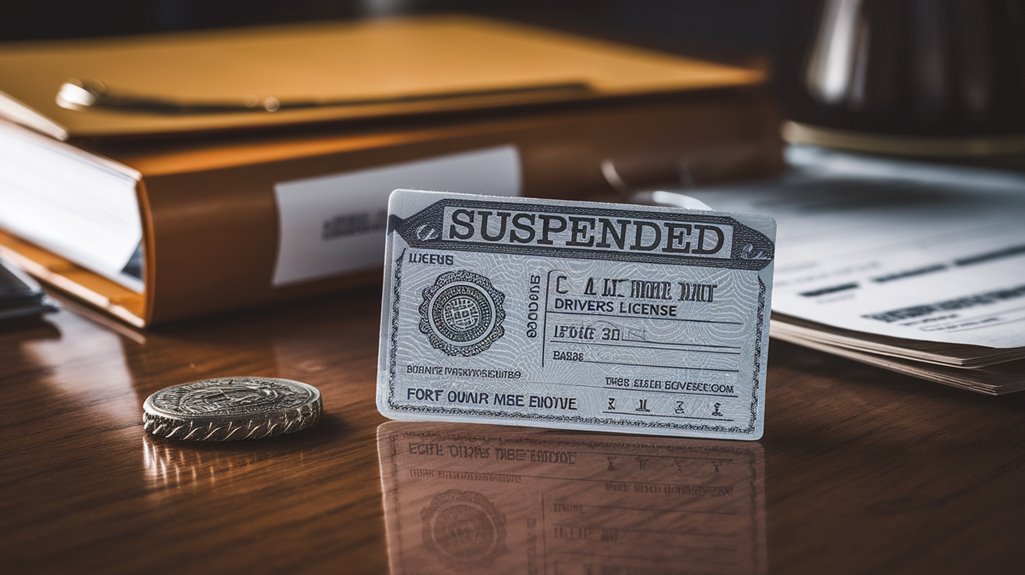
Drivers arrested for DUI in the Bay Area face immediate license suspension through a two-track system of penalties. When arrested, police take the license and issue a 30-day temporary driving privilege. Drivers have 10 calendar days to request a DMV hearing for license appeal.
| Action | Timeline |
|---|---|
| Request DMV Hearing | Within 10 days |
| Temporary Privileges | 30 days |
| First Offense Suspension | 4 months |
| Restricted License | After 30 days |
The DMV hearing process runs separately from criminal court proceedings. First-time offenders who take chemical tests face 4-month suspensions, while test refusal results in 1-year suspension. Under-21 drivers receive 1-year suspensions for any BAC above 0.01%. Restricted licenses allowing work and school travel become available after 30 days with proof of insurance and DUI program enrollment.
Field Sobriety Testing and Law Enforcement Protocols
Police officers in the Bay Area rely on three main field sobriety tests to check if someone is driving drunk. These tests, approved by NHTSA, include the Horizontal Gaze Nystagmus test that checks for eye movements, the Walk and Turn test that evaluates balance, and the One-Leg Stand that measures stability.
Testing reliability depends on proper administration. Officers must conduct tests on flat, dry surfaces and give clear instructions. They need to check for medical conditions or vision problems before starting. Some officers also use non-standardized tests like reciting the alphabet backward or counting sequences, but these aren't officially validated. To guarantee accuracy, officers often record the tests on video. They must also let drivers remove high-heeled shoes that could affect balance during testing.
Enhanced Penalties for Underage Drivers and Commercial Operators
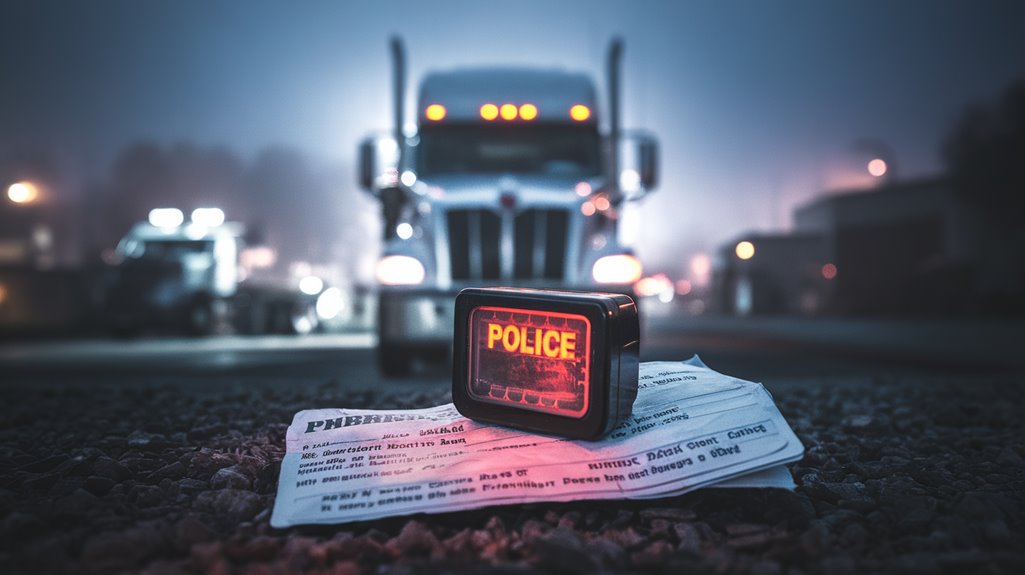
Bay Area jurisdictions maintain stricter DUI standards for two high-risk groups: drivers under 21 and commercial operators. For underage drivers, penalties kick in at just 0.01% BAC, resulting in one-year license suspensions and mandatory alcohol education programs. These underage penalties often include civil infractions, fines up to $250, and significant insurance increases.
Commercial operators face even tougher sanctions, with violations occurring at 0.04% BAC. Commercial sanctions include immediate license suspension, mandatory reporting to employers, and installation of ignition interlock devices. First offenses bring one-year suspensions, while subsequent violations can lead to lifetime commercial driving bans. Both groups face enhanced administrative consequences, with DMV suspensions occurring independently of court outcomes. Additional penalties apply for cannabis use or test refusal.
Legal Rights and Defense Options During DUI Proceedings
While facing DUI charges involves strict penalties, defendants maintain important legal protections throughout the process. After a DUI arrest, individuals have just 10 days to request a DMV hearing to contest license suspension. During arrest, police must read Miranda rights before questioning suspects in custody.
Defendants can pursue several defense strategies through legal representation. These include filing motions to suppress evidence from improper stops or testing procedures. At arraignment, drivers enter their plea and can request release through bail or their own recognizance, depending on case circumstances. Throughout proceedings, suspects have the right to consult with and retain a DUI defense attorney before making decisions about their case. This guarantees proper guidance through complex legal procedures and protection of constitutional rights.
Financial Impact: Fines, Fees, and Insurance Consequences
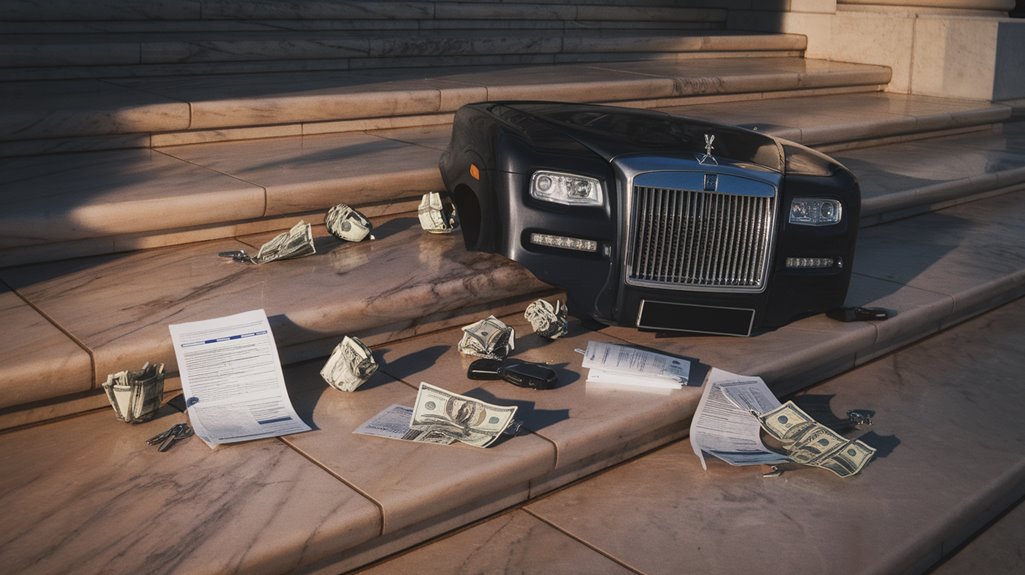
The financial toll of a DUI conviction in the Bay Area extends far beyond the initial fines of $500-$2,000 for first-time offenders. Insurance premiums typically spike 100-300% after a DUI conviction, with high-risk coverage requirements lasting up to five years and adding $400-$700 annually through SR-22 filings. When combined with mandatory alcohol education programs costing $750-$1,200, license reinstatement fees, and potential legal expenses of $2,000-$10,000, the total financial impact can exceed $10,000 over a five-year period.
Direct Fine Breakdown
Hefty fines and fees await underage drivers caught violating DUI laws in the Bay Area. A first offense carries a minimum fine of $1,000, which can escalate to $1,500 for subsequent violations. The fines breakdown includes additional administrative costs between $100-$200 for court processing.
Beyond the basic penalties, offenders face mandatory alcohol education programs costing $500-$1,000, plus annual probation supervision fees ranging from $300-$600. Court-ordered requirements add significant expenses, including ignition interlock devices with $100-$300 installation fees and monthly maintenance costs of $60-$100. Victim impact panels charge $50-$100 per session, while community service may require nominal court fees of $50-$100. License reinstatement comes with an immediate $100 fee after suspension periods end.
Insurance Rate Surge Analysis
Most Bay Area drivers face staggering insurance rate increases after DUI convictions, with premiums typically surging 20-30% for first-time offenses. Insurance premium fluctuations become more severe when BAC levels exceed 0.08%, potentially leading to increases of up to 177%. At-fault accidents compound these costs, adding another 78% to rates.
Risk assessment factors like vehicle type, marital status, and location influence how insurance companies calculate post-DUI premiums. Young drivers under 21 face particularly harsh consequences, as even minimal BAC levels trigger immediate rate hikes under zero-tolerance laws. Multiple DUI offenses result in exponential premium increases, and some insurers may cancel policies completely. When this happens, drivers must obtain coverage through specialized high-risk providers and maintain SR-22 filings.
Rehabilitation Programs and Education Requirements
Rehabilitating DUI offenders requires mandatory participation in state-approved education programs throughout the Bay Area. These programs run for three to six months under state supervision and focus on teaching participants about alcohol's effects on driving ability and judgment.
The education program formats include classroom sessions that address critical topics like responsible decision-making and strategies to resist peer pressure. Program completion is essential for both probation requirements and driver's license reinstatement. The rehabilitation program effectiveness depends on consistent attendance and active engagement in the curriculum.
State authorities monitor participant progress throughout the program duration. Offenders must demonstrate understanding of the material and show commitment to behavioral change before receiving completion certification that satisfies court mandates and DMV requirements.
Long-Term Effects on Driving Records and Employment
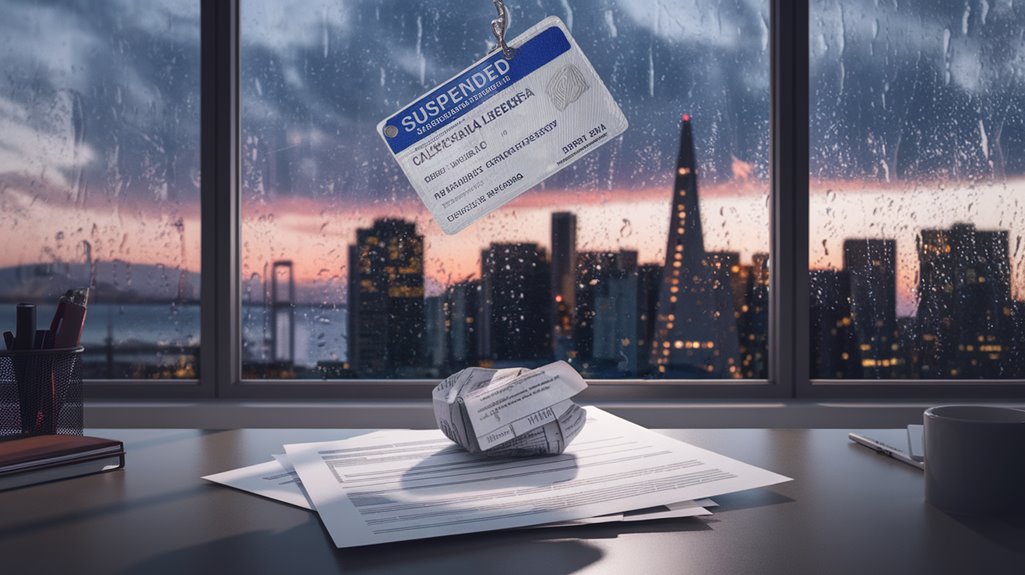
DUI convictions in the Bay Area carry lasting consequences that affect both driving privileges and career opportunities. The long term consequences extend far beyond the initial penalties, creating significant employment barriers that can persist for over a decade.
A DUI conviction in the Bay Area doesn't just affect your license – it can derail your career path for years to come.
Key impacts include:
- One-year automatic license suspension for drivers under 21 with BAC ≥0.01%
- Mandatory high-risk SR-22 insurance filing for at least 3 years
- DUI records visible for 10+ years on driving history
- Required disclosure on job applications, especially in licensed professions
These effects can limit career options, particularly in healthcare, transportation, and military service. Many employers view DUI convictions as serious red flags, often leading to denied applications or revoked positions in roles requiring trust or driving responsibilities.
Cross-County Enforcement and Regional Checkpoint Operations
The Bay Area maintains a robust network of cross-county DUI enforcement measures to catch impaired drivers. Through cross county collaboration, law enforcement agencies coordinate checkpoint operations and share real-time data about high-risk drivers. Checkpoint effectiveness is enhanced by strategic placement along major corridors like I-880 and Highway 101.
| Enforcement Area | Key Features | Impact |
|---|---|---|
| License Control | DMV oversight | Statewide suspension |
| Checkpoints | PAS devices | Immediate detection |
| Task Forces | Multi-agency | Enhanced coverage |
| Data Sharing | DL CIDE program | Real-time updates |
| Penalties | Uniform fines | Consistent enforcement |
Agencies use standardized testing equipment, including PAS devices that detect BAC levels as low as 0.01% for underage drivers. This coordinated approach guarantees consistent enforcement across all Bay Area counties, with particular focus on late-night and early-morning operations when impaired driving risks are highest.
Frequently Asked Questions
Can I Refuse a Preliminary Alcohol Screening Test Before Arrest?
Adult drivers (21+ and not on DUI probation) can legally refuse a preliminary alcohol screening test before arrest. However, refusal consequences may include increased suspicion and likelihood of arrest based on other evidence. The testing protocol requires officers to inform drivers about refusal implications. Certain groups must comply, including drivers under 21, DUI probationers, and commercial drivers. Officers still need other signs of intoxication to establish probable cause. Additionally, understanding implied consent in California is crucial for drivers to navigate their rights and responsibilities effectively. While adults have the option to refuse a preliminary alcohol screening test, it is important to recognize that other forms of testing, such as blood or breath tests, may be required if the driver is arrested for DUI. Ignorance of these laws can lead to severe penalties and complications during legal proceedings, emphasizing the need for drivers to be educated about their rights and the potential consequences of their actions.
How Do Prescription Medications Affect Zero-Tolerance DUI Charges?
Even legally prescribed medications can lead to DUI charges when they impair driving ability. While drivers may think following prescription guidelines protects them, zero-tolerance laws don't distinguish between legal and illegal substances. Prescription interactions can cause unexpected impairment through drowsiness, blurred vision, or slowed reactions. Taking medications exactly as prescribed isn't a complete defense – if driving is affected, charges can still apply regardless of the drug's legal status.
Will My DUI Arrest Show up on Background Checks During Probation?
DUI arrest records typically show up on background checks during probation unless the charges were dismissed or sealed. While on probation, the arrest remains visible as an unresolved criminal case. Probation consequences include enhanced scrutiny from employers, especially for driving-related positions. California employers can see arrest data until probation is completed and the case is expunged. Some industries, particularly those requiring commercial licenses, have stricter reporting requirements.
Can I Drive to Work During a Restricted License Period?
During a restricted license period, drivers may be allowed to commute to and from work, but with specific limitations. They must follow exact routes and schedules approved by the court. Restricted license options typically include essential travel for employment, but drivers need proper documentation from their employer. Some areas require additional permits or special arrangements. It's important to strictly follow these work commute limitations to avoid further legal issues.
What Happens if I Move to Another State During License Suspension?
Moving to another state during a license suspension doesn't eliminate the consequences. License transfer between states isn't possible while suspended, as state laws require resolving all prior suspensions first. The original suspension follows drivers through a national database system. New states won't issue a license until the suspension period ends and all fines and requirements from the original state are satisfied. This applies even after establishing residency elsewhere.
Conclusion
Bay Area DUI laws hit like a ton of bricks, crushing offenders with mountains of fines, endless paperwork, and enough stress to turn hair gray overnight. Getting behind the wheel after drinking isn’t just illegal – it’s career suicide and wallet destruction rolled into one. Smart drivers dodge this bullet by planning ahead, because one wild night isn’t worth the nuclear fallout of zero tolerance enforcement. Even first-time offenders face license suspensions, mandatory DUI programs, and skyrocketing insurance rates that can haunt them for years. Some attempt an unauthorized vehicle use defense, arguing they had no intention of driving, but courts rarely buy this excuse. In the Bay Area, law enforcement takes no chances, ensuring that anyone caught driving under the influence pays a steep price. Moreover, the repercussions extend beyond just legal penalties; many offenders experience significant personal and professional setbacks that can linger long after the dust settles. In light of these harsh realities, some individuals may explore house arrest for DUI alternatives, which can sometimes offer a less severe punishment but still require compliance with strict regulations. Ultimately, the best strategy is to prioritize safety and opt for a designated driver or rideshare service to avoid the devastating consequences of a DUI. In addition to the legal repercussions, offenders often find themselves navigating the murky waters of their Miranda warning rights in the Bay Area, which can profoundly impact their defense strategies. Knowing these rights is crucial, as anything said before being informed can be used against them in court, complicating their case further. With the stakes this high, it’s clear that understanding both the law and one’s rights is essential for anyone wishing to steer clear of the severe aftermath of a DUI arrest. Additionally, the repercussions don’t stop with fines and penalties; many offenders find themselves facing severe restrictions on their freedom. In some cases, house arrest as a legal option may be available, allowing them to fulfill their obligations while still grappling with the consequences of their actions. Ultimately, the best defense against these strict DUI laws is simply to refrain from drinking and driving altogether, ensuring a safer experience for everyone on the road.
